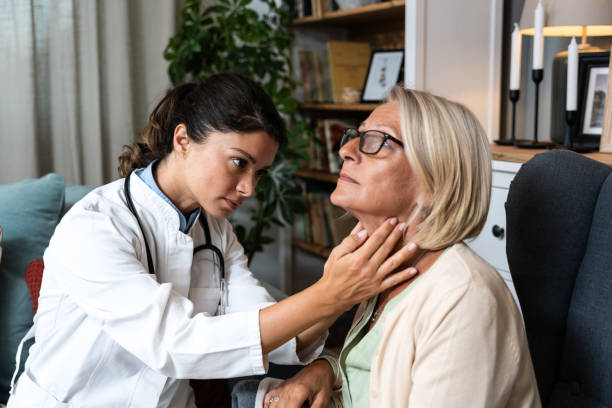Tips and Tricks to Get A Discount in Disney
Top 5 World’s Most Liveable Cities For 2024
Top 5 Plants You Should Never Lack For Your Mental Wellness
How to Choose the Right Air Fryer for Your Kitchen?
Boost Your Motivation: 7 Simple Hacks to Stay Inspired
How to Nurture Mental Health for Busy Parents
Identify the Early Signs of Lymphoma
Early detection of lymphoma can save lives. Learn about the subtle signs and symptoms that may indicate this type of cancer and why timely detection is important.
Early detection of lymphoma can save lives. Learn about the subtle signs and symptoms that may indicate this type of cancer and why timely detection is important.

Lymphoma is a type of cancer that occurs in the lymphatic system, which plays an important role in the body's immune response. Early detection is essential for effective treatment, so it is crucial to understand the symptoms. This article aims to shed light on the early symptoms of lymphoma, the types of lymphoma, possible causes, the importance of consulting a doctor, available treatment options, and the role of lifestyle in managing your health after diagnosis. After reading it, readers will have a clearer understanding of this disease and know how to act quickly when symptoms appear.
Understanding Lymphoma: Types and Causes
Lymphoma is divided into two main categories: Hodgkin lymphoma and non-Hodgkin lymphoma. Hodgkin lymphoma is characterized by the presence of Reed-Sternberg cells, while non-Hodgkin lymphoma includes a variety of blood cancers. Each type exhibits different behaviors and treatment responses.
The causes of lymphoma are not completely understood, but some factors have been identified that may increase your risk. These include age, which significantly increases risk, as most cases occur between the ages of 15 and 40 and in people over the age of 55. Another factor is a family history of lymphoma, which indicates a genetic predisposition. In addition, a weakened immune system due to diseases such as HIV/AIDS or organ transplants can also significantly increase risk. Environmental factors, such as exposure to certain chemicals or agents used in previous cancer chemotherapy, may also play a role.
Common Early Symptoms to Watch Out For
Lymphoma does not always show symptoms in the early stages, but when symptoms do occur, they can be subtle but alarming. One of the most common early symptoms is swollen lymph nodes, which are usually felt in the neck, armpits, or groin.
This swelling is usually not accompanied by pain and can be ignored as a normal response to infection.
Another symptom is unexplained weight loss. Uncontrolled weight loss of more than 10% over a six-month period is serious and should be a reason to see a doctor. Fever, night sweats, and fatigue are also typical symptoms. Night sweats can cause patients to feel damp in the morning, and fatigue persists despite adequate rest. Finally, itching may also occur, usually without a noticeable rash, causing unexplained discomfort. Identifying these early signs is essential for timely intervention.
Importance of Early Detection and Advice
Early detection of lymphoma can significantly improve treatment outcomes and survival rates. When diagnosed at an early stage, patients generally respond better to treatment, which can range from chemotherapy to radiation therapy and stem cell transplants, depending on the specific type of lymphoma and its stage.
If any of the above symptoms occur, it is imperative to see a doctor. Diagnostic tests, including blood tests, imaging tests such as CT scans and biopsies, can help determine the presence of lymphoma. Regular checkups and screenings are also advisable for those at higher risk. The earlier lymphoma is detected, the easier it is to treat effectively. Ignoring symptoms may cause the disease to progress to a more serious stage, where treatment becomes less effective and more complicated. This urgency emphasizes proactive health care and communication with health care providers.
Available Treatment Options
Treatment options for lymphoma vary depending on the type and stage. Typically, patients receive chemotherapy, which uses drugs to kill cancer cells or stop them from growing. Radiation therapy may also be used, especially for localized tumors. Recent advances have led to the use of immunotherapy, which uses the body's immune system to fight cancer more effectively. Additionally, targeted therapy drugs can target cancer cells without harming normal cells, which is proving to be a breakthrough in treatment.
Clinical trials are another approach worth exploring. These trials test new treatments and allow patients to have access to innovative therapies. Side effects vary, but can include nausea, hair loss, and increased risk of infection. Understanding these side effects can help patients better prepare and manage their treatment. Staying informed of all options and having a thorough discussion with their doctor can help patients make decisions.
Lifestyle Adjustments and Treatment After Diagnosis
After a lymphoma diagnosis, lifestyle adjustments can play an important role in recovery and overall health. A balanced diet with plenty of fruits, vegetables, and lean protein can support the immune system. Equally important is adequate hydration, as it helps flush out toxins during treatment and maintain overall health.
Physical activity, depending on the patient's condition and energy level, can also promote recovery. Gentle exercise, such as walking or yoga, can improve mood and relieve treatment-related fatigue. Additionally, regular mental health care through counseling or support groups can provide emotional support and coping strategies and help patients navigate their journey more effectively. Patients are also advised to avoid smoking and limit alcohol consumption, as it can exacerbate health issues. Good sleep hygiene, stress management techniques, and maintaining a strong social network can contribute to overall health.
Recognizing the early symptoms of lymphoma can have a significant impact on treatment outcomes. Symptoms such as swollen lymph nodes, unexplained weight loss, fever, night sweats, fatigue, and itching should not be ignored. Understanding the types and causes of lymphoma can help increase awareness, while understanding the importance of early consultation can lead to timely and effective treatment options. Lifestyle adjustments after diagnosis further improve recovery and well-being. Awareness and knowledge enable individuals to take responsibility for their own health and act quickly when necessary.











